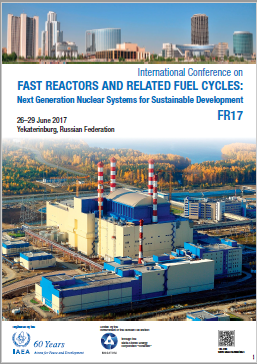Speaker
Dr
Alexander Salyulev
(Institute of High Temperature Electrochemistry)
Description
Pyroelectrochemistry is one of the most prospective approaches for spent nitride nuclear fuel (nitride SNF) reprocessing. It includes the anodic dissolution of the SNF pellets into the molten LiCl-KCl eutectic with the subsequent electrochemical separation of U, Pu, Np, Am from other constituents. Physical-chemical properties of such complex melts are still insufficiently studied.
The electrical conductivity of a number of quasi binary melts (LiCl-KCl)eut., containing CeCl3, NdCl3, UCl3, as well as CsCl and CdCl2, are studied in detail in the present work. The majority of measurements were performed in the whole concentration range and in the wide temperature range from the liquidus point to 900 - 920 0C. The electrical conductivity of a number of 3-4 component (LiCl-KCl)eut. - CeCl3 - NdCl3 - UCl3 mixtures was measured.
The density of the melts under study was evaluated and their molar conductivity was calculated. The liquidus line of these salt systems was built using the polytherm breakpoints. These data are required to create a general model for the electrolyzer operation and to develop complied technological equipment.
This research was partially supported by the Russian Ministry of Education and Science through Targeted Federal Program (project number: 14.607.21.0084).
Country/Int. Organization
Russia / Institute of High Temperature Electrochemistry
Primary author
Dr
Alexander Salyulev
(Institute of High Temperature Electrochemistry)
Co-authors
Prof.
Alexei Potapov
(Institute of High Temperature Electrochemistry)
Dr
Vladimir Shishkin
(Institute of High Temperature Electrochemistry)

